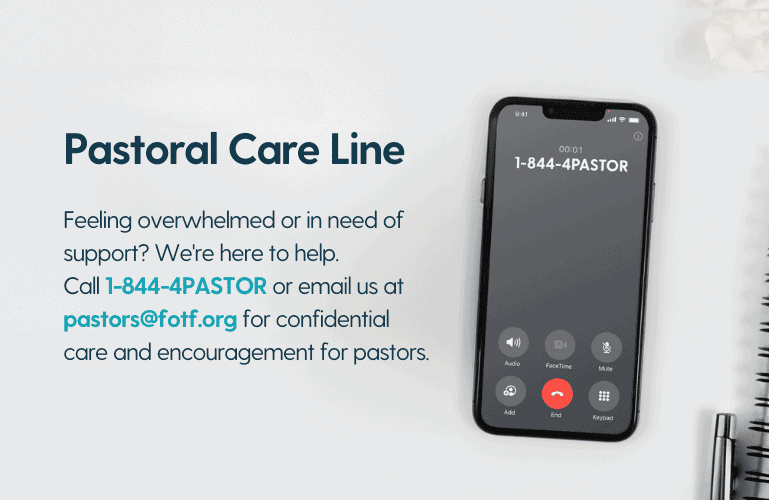Maintaining Thankfulness During Pastoral Trials
Estimated reading time: 4 minutes
The Bible contains a hard command that is difficult even for pastors to obey: “Rejoice always, pray without ceasing, give thanks in all circumstances; for this is the will of God in Christ Jesus for you” (1 Thessalonians 5:16-18). By nature, we are the opposite of thankful; we naturally complain and are ungrateful. Regrettably, Jerry Bridges is correct when he writes:
“We are anxious to receive but too careless to give thanks.”1
Therefore, we must be careful to practice the discipline of thanksgiving. As we do so, it will guard our joy and spill over in gratitude as an example to our congregations.
It is no accident that the command to “pray without ceasing” is sandwiched between “rejoice always” and “give thanks.” Central to preserving joy and maintaining thankful hearts is cultivating our daily, moment-by-moment dependence on God in prayer. This discipline of prayer builds a healthy foundation for humble responses when the challenges of pastoral ministry threaten our peace or provoke us to complain.
Maintaining an attitude of thanksgiving expressed through constant prayer provides at least three benefits.
Thankfulness combats anxiety and invites peace
Thankfulness is a mindset; it is a choice. As such, it is a remedy for the worry that often overtakes our pastoral hearts. Philippians 4:6–7 instructs us to “Be anxious for nothing, but in everything by prayer and supplication with thanksgiving let your requests be made known to God. And the peace of God, which surpasses all comprehension, will guard your hearts and your minds in Christ Jesus.”
Why did Paul add the words with thanksgiving? It is because an anxious spirit cannot coexist with a thankful one.
Thankful prayer bids the security guard called peace to stand post at the doors of our hearts, forcing out worry and forbidding its reentrance. Thankfulness is the proper attitude of prayer: “Devote yourselves to prayer, keeping alert in it with an attitude of thanksgiving” (Colossians 4:2). Thanksgiving is key to gaining victory over our anxiety because it deliberately shifts our heart’s eye from our current worries to the mighty works of God.
Thankfulness reminds us that God calls and qualifies us
When we pray for ourselves and our flocks, we should never forget the only reason God hears us is that Jesus, our mediator and advocate, intercedes for us (1 Timothy 2:5; 1 John 2:1; Hebrews 7:25). Thankfulness protects us from the prideful thought that we possess even an ounce of virtue in and of ourselves that obligates God to listen to us. We approach God’s throne of grace in prayer because of Christ and Christ alone (Hebrews 4:15).
The apostle Paul frequently prayed for the spiritual growth of believers under his care. For example, at the end of the list of spiritual qualities for which he asked God to produce in the hearts of the Colossians is a powerful reminder: You need to give “thanks to the Father, who has qualified you to share in the inheritance of the saints in light” (Colossians 1:12). While you “keep a close eye on yourself and on the teaching” (1 Timothy 4:16), be sure also to remain thankful that God is ultimately the one who qualifies you in Christ. This remembrance will overflow in thanksgiving to your Savior.
Thankfulness recognizes God as the source of our strength
In times of pastoral weakness, we discover just how strong the strength of God is. This is a lesson God taught Paul by permitting Satan to afflict him with a “thorn in the flesh,” which the apostle repeatedly pleaded with God to remove. However, although Satan’s goal is always to kill and destroy, God had certain plans to use that thorn to further the development of Christlike character in the apostle. God knew Paul was susceptible to the pride of self-sufficiency, and therefore, he needed to learn that the strength of God was made perfect in his servant’s “weakness” (2 Corinthians 12:9).
Besides his personal struggles, Paul faced severe treatment from others (2 Corinthians 4:8–10). It may tempt us to think that this much suffering must inevitably result in a spirit of complaining and bitterness, but such was not the case with Paul. Instead, he wrote to Timothy, “I thank Christ Jesus our Lord, who has strengthened me, because He considered me faithful, putting me into service” (1 Timothy 1:12).
The secret to Paul’s strength was his inner reliance on Christ, who not only called him into the ministry but also promised to strengthen him to persevere to the end.
As pastors, we must remember that to “rejoice always, pray without ceasing, [and] give thanks in all circumstances” is part of the example we leave to our flocks. A lifestyle of prayer is God’s will for every believer in Christ: “this is the will of God in Christ Jesus for you.” But the “you” referred to by the apostle is not merely the individual believer but the congregation of believers who first heard this letter publicly read to them. Therefore, as important as it is for us to stress the value of constant prayer in our individual lives, it is equally important to understand the significant value it is for our flocks to see in us an example of thankfulness amid trials.
©2024, 2025 Paul Tautges. Used with permission.
- Jerry Bridges, The Practice of Godliness (Colorado Springs: NavPress, 1983), 124–125.0 ↩︎
About The Author

Paul Tautges
Paul Tautges serves as senior pastor of Cornerstone Community Church in Mayfield Heights, Ohio. He is also a counselor and the author of the 31-day devotional Anxiety: Knowing God’s Peace.









